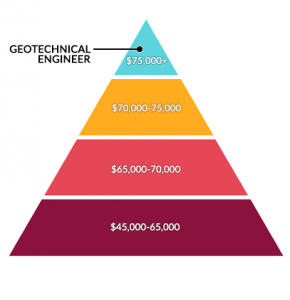See This Report about Geotheta
See This Report about Geotheta
Blog Article
The Facts About Geotheta Uncovered
Table of ContentsSome Known Incorrect Statements About Geotheta 3 Easy Facts About Geotheta DescribedGeotheta Fundamentals ExplainedThe 5-Second Trick For GeothetaGeotheta Fundamentals Explained

They conduct site examinations, gather samples, execute laboratory tests, and analyze data to examine the viability of the ground for construction projects - Geo Tech Engineering. Based upon their searchings for, geotechnical engineers supply referrals for foundation style, incline stability, keeping frameworks, and reduction of geotechnical risks. They collaborate with various other professionals, such as designers, structural engineers, and construction teams, to ensure that geotechnical factors to consider are incorporated right into the total task layout and implementation
By evaluating the habits and residential or commercial properties of soil and rock, they can identify possible geotechnical hazards such as landslides, dirt settlement, or slope instability. Their know-how aids protect against failings or accidents that can jeopardize lives and property. Below are some thorough duties and responsibilities of a geotechnical designer: Site Investigation: Geotechnical engineers conduct site investigations to collect data on subsurface conditions.
They analyze the information to recognize the homes and habits of the soil and rock, including their stamina, leaks in the structure, compaction characteristics, and groundwater problems. Geotechnical Analysis and Design: Geotechnical designers examine the data accumulated during site examinations to examine the security and viability of the website for construction projects. They perform geotechnical computations and modeling to assess factors such as bearing capacity, negotiation, incline stability, lateral earth pressures, and groundwater circulation.
The Ultimate Guide To Geotheta
Foundation Layout: Geotechnical engineers play an important role in making structures that can safely support the designated framework. They examine the dirt conditions and tons requirements to figure out the appropriate structure type, such as superficial foundations (e.g., grounds), deep foundations (e.g (https://www.mixcloud.com/geotheta/)., heaps), or specialized strategies like dirt renovation. They take into consideration aspects such as settlement limits, bearing ability, and soil-structure communication to establish optimal structure layouts
They evaluate building strategies, screen site tasks, and carry out field inspections to validate that the style suggestions are followed. If unforeseen geotechnical concerns occur, they evaluate the circumstance and provide referrals for removal or adjustments to the layout. Danger Assessment and Reduction: Geotechnical engineers analyze geotechnical dangers and risks connected with the job site, such as landslides, liquefaction, or dirt disintegration.

Cooperation and Interaction: Geotechnical engineers function carefully with various other experts involved in a job, such as architects, structural designers, and building groups. Reliable communication and cooperation are vital to integrate geotechnical factors to consider into the general project style and construction procedure. Geotechnical engineers supply technical experience, answer questions, and guarantee that geotechnical needs are satisfied.
The Main Principles Of Geotheta
Below are some kinds of geotechnical engineers: Structure Designer: Structure designers specialize in creating and assessing structures for frameworks. They assess the soil conditions, tons needs, and site characteristics to identify the most proper structure kind and layout, such as superficial structures, deep structures, or specialized strategies like heap structures.
They examine the aspects affecting incline security, such as soil properties, groundwater problems, and incline geometry, and create approaches to stop slope failures and mitigate risks. Earthquake Designer: Quake designers concentrate on examining and making frameworks to stand up to seismic pressures. They evaluate the seismic risk of a site, review dirt liquefaction capacity, and develop seismic style requirements to make sure the security and durability of frameworks throughout quakes.
They carry out field screening, accumulate samples, and evaluate the collected information to define the dirt residential properties, geologic formations, and groundwater conditions at a website. Geotechnical Instrumentation Engineer: Geotechnical instrumentation designers concentrate on tracking and measuring the actions of soil, rock, and structures. They install and keep instrumentation systems that keep an eye on elements such as dirt settlement, groundwater degrees, slope activities, and structural displacements to examine performance and give early cautions of prospective issues.
Getting The Geotheta To Work
They conduct tests such as triaxial examinations, combination examinations, straight shear tests, and leaks in the structure examinations to gather data for geotechnical evaluation and layout. Geosynthetics Engineer: Geosynthetics engineers focus on the layout and application of geosynthetic materials, such as geotextiles, geogrids, and geomembranes. They use these products to boost soil security, enhance slopes, supply water drainage solutions, and control erosion.
They tend to be investigative individuals, which means they're intellectual, introspective, and curious. They are curious, methodical, sensible, logical, and logical. Some of them are also social, implying they're kind, charitable, participating, patient, caring, helpful, empathetic, tactful, and pleasant - Geo Tech Engineering.
In the office setting, geotechnical designers make use of specialized software program tools to execute computations, produce styles, and assess data. They prepare reports, Visit This Link review project requirements, connect with customers and staff member, and coordinate task activities. The office setup supplies a conducive setting for study, evaluation, and collaboration with various other experts included in the project.
Indicators on Geotheta You Need To Know
They frequently check out task sites to perform website investigations, examine geotechnical conditions, and gather information for analysis. These gos to entail traveling to different areas, sometimes in remote or difficult surfaces. Geotechnical engineers may do dirt sampling, conduct tests, and display construction tasks to make certain that the geotechnical aspects of the job are being applied correctly.
Geotechnical engineers also work in specialized geotechnical laboratories. Geotechnical laboratory engineers work thoroughly in these settings, handling screening tools, running tools, and taping information.
Report this page